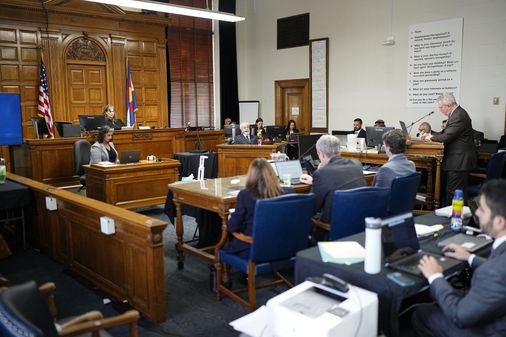
A recent ruling by a Colorado state judge laid bare how perilous the legal challenges that seek to constitutionally disqualify former president Donald Trump from a presidential comeback really are. At best, they present a host of novel legal issues that have divided even the sharpest members of our nation’s jurisprudential brain trust. At worst, they could end in a Supreme Court decision that could clear the way for future presidents to attack the very pillars of our democracy with impunity.
The events of Jan. 6, 2021, showed us how easily a nation can be torn apart if trust in our institutions is eroded. Even the perception that the next president will be chosen by a series of legal maneuvers as opposed to the will of the people could cause more damage to the Republic.
It is understandable why groups such as Citizens for Responsibility and Ethics in Washington and Massachusetts-based Free Speech for People have brought legal challenges in various states seeking to stop election officials from placing Trump on 2024 ballots.
Their challenges are based on Section 3 of the 14th Amendment. That provision bars anyone who previously took an oath “to support the Constitution of the United States” from holding office again if they “engaged in insurrection or rebellion.” Such disqualification can only be removed by a two-thirds vote in both houses of Congress.
A number of legal scholars and experts from across the ideological spectrum, from the Federalist Society’s William Baude and Michael Stokes Paulsen, to Harvard Law professor emeritus Laurence Tribe, to conservative retired judge J. Michael Luttig have argued that this provision in itself bars Trump from ever returning to the Oval Office.
Yet so far, the challengers have been winless. Courts in Michigan and Minnesota have refused to order that Trump be removed from primary election ballots, either because Congress has failed to speak on the matter or because the decision to place nominees on the ballot is up to political parties, not courts.
But in Colorado, the challengers’ loss was even more potentially disastrous. While District Judge Sarah B. Wallace ruled that Trump did “engage in an insurrection,” because Section 3 does not clearly and unmistakably refer to the office of the presidency, she wrote, she could not “embrace an interpretation which would disqualify a presidential candidate.”
This theory — that the presidency is exempt from the disqualification clause — has been embraced by a growing number of legal experts, including Northwestern University law professor Steven Calabresi.
The cases will be appealed and will likely ultimately end up at the Supreme Court. That a nation’s highest court could be in the position to make this until-now unsupported legal theory the law of all the land should give all democracy-loving citizens pause.
There are a host of other issues that can prove to be legal landmines in these types of challenges. How is the disqualification clause, which was enacted in order to prevent former Confederates from holding office after the Civil War, actually supposed to work? Does it need an enabling statute — a law passed by Congress to allow it to be enforced? Does deeming Trump to be an insurrectionist require more than the opinion of one state court judge?
Even if a host of constitutional scholars and respected legal leaders believe the issue is clear cut, as the three rulings that have been issued so far prove, it is anything but. With the novel questions that these legal challenges present, it would be foolhardy to believe that this is the most surefire way to keep Trump out of office permanently.
There is a definite way to do so: at the ballot box.
It is important to state, over and over again with clarity and urgency, that Trump is unfit for office. It is also important for the justice system, in the myriad civil and criminal cases Trump is currently facing, to hold the former president responsible. And it is also vital for the decision to keep Trump out of the White House for good to be made by the voters. Their rebuke of Trump would be the most powerful.
Editorials represent the views of the Boston Globe Editorial Board. Follow us @GlobeOpinion.
This post was originally published on this site be sure to check out more of their content.






